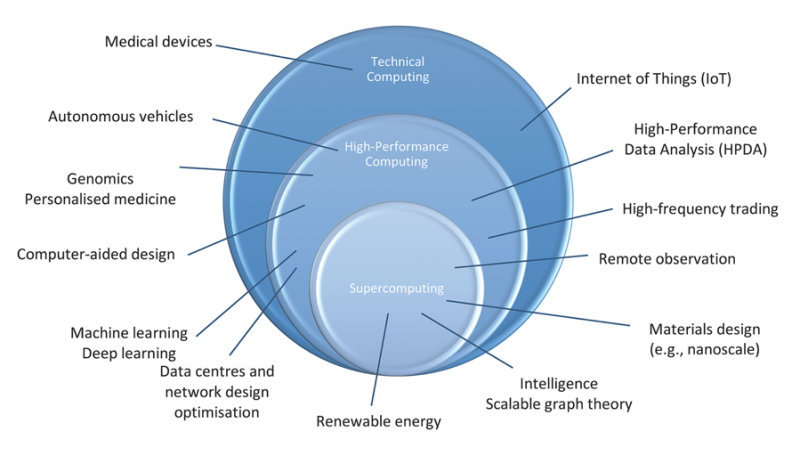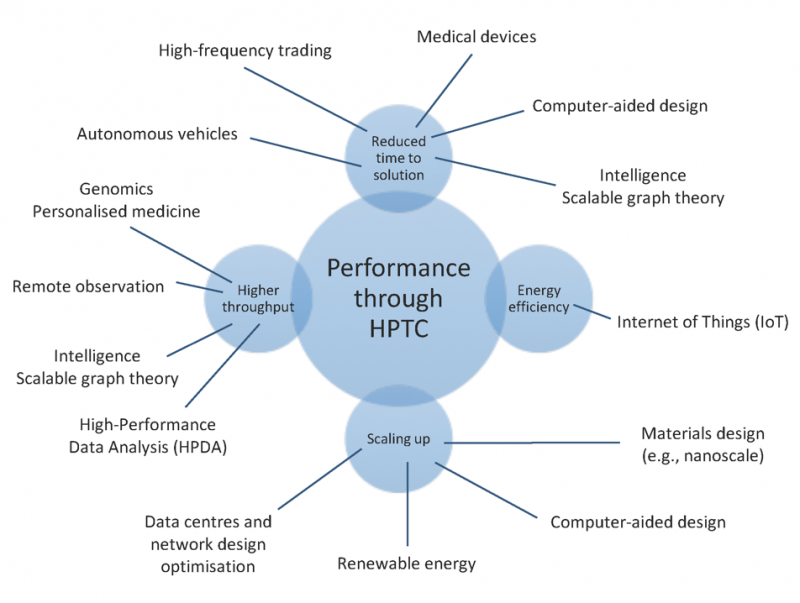About High-Performance Computing (HPC)
HPC: a strategic platform for innovation and competitiveness
High-Performance and Technical Computing (HPTC) is often confused with Supercomputing. In fact, Supercomputing is a subset of High-Performance Computing, which is itself a subset of Technical Computing.
HPC, as a methodology, has a wide applicability to both established and emerging domains, such as autonomous vehicles, the Internet of Things or precision agriculture. In fact, HPTC is the platform technology par excellence. It is concerned with programming for performance, where performance takes the broad meaning of speed (reducing time to solution), energy efficiency (doing more with less power power), upscaling (handling larger problems, e.g., from simulating a wing to a full plane, or from a cell to an organ) or high throughput (the ability to handle large volumes of data in near real-time, such as required in the financial services industry, telecoms or satellite imagery).
Figure: Relevance of HPC to strategic and emerging domains

HPC is commonly described as a key platform for economic competitiveness and innovation. Such positions have been taken by the European Commission (EC) [1] and the European Parliament in Europe, and by the White House [2], the National Science Foundation (NSF) as well as the Departments of Defence and of Energy in the US and the EU and US Councils for Competitiveness [3]. This sentiment is replicated across most EU countries (UK, Germany, France, Italy, Finland, Switzerland, the Netherlands, the Czech Republic, Luxembourg) as well as further afield (Japan, China, Russia, Saudi Arabia, Brazil, South Africa) where national initiatives are underway. EC Commissioner for Digital Economy & Society, Günther H. Oettinger, has been particularly vocal in his support of HPC and its key role in enabling innovation and competitiveness in the EU. Commissioner Oettinger has been personally involved in helping a number of EU Member States to launch their own national initiatives [4]. More recently, the EC created the concept of Important Projects of Common European Interest (IPCEIs) [5], perhaps the catalyst to delivering the vision of Prof. Mateo Valero Barcelona Supercomputing Centre Director: “A window of opportunity is open! It’s time to invest in a Flagship project for Europe to succeed in HPC – Maybe we need an AIRBUS consortium for HPC and Big Data!”, March 2016.
Figure: What High-Performance and Technical Computing brings to strategic and emerging domains

“Our ambition is to be in the global top 3 in high performance computing by 2020”
One of the strategic areas where the effectiveness of HPC as a platform for innovation and competitiveness is compelling is when coupled with Big Data [FOOTNOTE 1] leading to a new paradigm known as High-Performance Data Analysis (HPDA). As many put it:
HPC + Big Data = HPDA
HPC and the cloud
Cloud computing is often but mistakenly positioned as a cheaper alternative to HPC. This is incorrect on both accounts. Cloud computing is a vehicle for the provision of ICT resources, which may be used for a variety of applications, including certain classes of computational modelling. It is therefore incorrect to conceive Cloud computing as competing or replacing HPC. In fact, there is widespread consensus across industry and analysts that the trend will be for HPC resources to be increasingly accessed via a Cloud interface. Cloud computing is therefore becoming an increasingly popular delivery mechanism for HPC resources, but does not make HPC obsolete – in fact it will have the opposite effect by making HPC more broadly available and therefore democratising the use of HPC.
“In 2014 10% of HPC spend was Cloud based. In 2017, this is forecast to be 20%”
“Clouds have the potential to double the HPC market size in 5-6 years”
ICHEC has monitored these technology developments very carefully, and believes that Cloud computing middleware will become sufficiently advanced in terms of features and performance in the next two to three years to be used within the context of a National HPC Service. As Intel General Manager for HPC platforms recently stated “most of today’s public clouds are not HPC optimized YET” [6]. On the financial front, while cost (based on FEC) remains firmly in favour of operating our own resources on-premises (but possibly as a Private Cloud) we expect that market forces will bring HPC services by Public Cloud providers such as Microsoft Azure to comparable levels by 2020-2025.
This analysis underpins ICHEC's infrastructure roadmap (funding not yet secured)
Finally, the emergence of Cloud Computing for HPC provides ICHEC and Ireland with new opportunities such as:
- to develop partnership with major public Cloud operators such as Microsoft, Google or Amazon, e.g., where ICHEC would offer application support as part of the portfolio of optional services offered by this commercial provider to academic customers;
- to help Industry and Public sector agencies migrate workflows to public cloud and create new services where none existed before due to resource limitations;
- to take an active role in the development of the European Cloud initiative, an initiative expected to bring over €6bn from the EU H2020, EU Member States and private sources [7].
“European Cloud Initiative will unlock the value of big data by providing world-class supercomputing capability, high-speed connectivity and leading-edge data and software services for science, industry and the public sector.”
We concur with the Commission that Cloud technology will prove instrumental in democratising HPC and making this technology available more widely available not only across Academia, but also Industry and the Public Sector – segments where ICHEC has already accomplished significant inroads.
[FOOTENOTE 1] Here the term “Big Data” is used primarily to describe applications centred on large volumes of data.
References
[1] “High-Performance Computing (HPC)”.
[2] “Executive Order -- Creating a National Strategic Computing Initiative”, 2015. President Barack Obama.
[3] “Council on Competitiveness Report on High Performance Computing Illustrates Path to Enhancing U.S. Manufacturing and Innovation”, 22nd October 2015.
[4] “Luxembourg launches Supercomputing Project”, 8th January 2016. Blog Post By Günther Oettinger, EC Commissioner for Digital Economy & Society.
[5] “State aid: Commission adopts new rules to support important projects of common European interest”, press release, Brussels, 13 June 2014.
[6] “Intel’s 13th EMEA HPC Roundtable”, 13-14 April 2016 in Toulouse (France).
[7] “European Cloud Initiative to give Europe a global lead in the data-driven economy”, 19th April 2016. European Commission press release, Brussels



